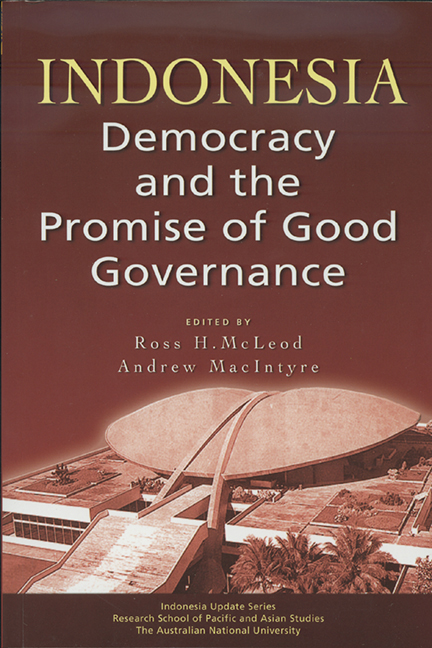Book contents
- Frontmatter
- Contents
- List of Tables and Figures
- List of Contributors
- Acknowledgments
- Glossary
- 1 Introduction
- PART I FORMING AND REFORMING THE ARCHITECTURE of GOVERNANCE
- 2 Indonesia's Constitutional Change Reviewed
- 3 Electoral and Political Party Reform
- 4 Tracing the Progress of Local Governments since Decentralisation
- PART II THE ROLES OF GOVERNMENT
- PART III THE INSTITUTIONS OF GOVERNMENT
- Index
- INDONESIA UPDATE SERIES
4 - Tracing the Progress of Local Governments since Decentralisation
from PART I - FORMING AND REFORMING THE ARCHITECTURE of GOVERNANCE
Published online by Cambridge University Press: 21 October 2015
- Frontmatter
- Contents
- List of Tables and Figures
- List of Contributors
- Acknowledgments
- Glossary
- 1 Introduction
- PART I FORMING AND REFORMING THE ARCHITECTURE of GOVERNANCE
- 2 Indonesia's Constitutional Change Reviewed
- 3 Electoral and Political Party Reform
- 4 Tracing the Progress of Local Governments since Decentralisation
- PART II THE ROLES OF GOVERNMENT
- PART III THE INSTITUTIONS OF GOVERNMENT
- Index
- INDONESIA UPDATE SERIES
Summary
Formally launched in 2001, the decentralisation of governmental authority is one of the most important reform programs in Indonesia. Both supporters and critics of the program acknowledge that decentralisation has changed the landscape of the central–local political relationship. However, a closer examination of the effects of decentralisation reveals significant variations across the country. Recent research indicates local state capture and rampant corruption in some jurisdictions, but deepening democracy and the emergence of effective government in others. What explains these variations in outcomes across Indonesia? What conditions are shaping the experiences of local governments with decentralisation? And, at this early stage, what conclusions can we draw about the gains and losses associated with decentralisation?
In this chapter I investigate some of the factors determining decentralisation outcomes at the local level. I identify some of the gains and losses associated with decentralisation and explain the conditions shaping these. Based on an examination of how decentralisation has actually been implemented in four localities, I argue: (1) that decentralisation should be viewed as an extended process; (2) that the power and interaction of state and societal actors at the local level, as well as the penetration of national and international actors, are salient factors determining the trajectory and outcome of decentralisation in particular localities; and (3) that these interactions happen iteratively and are shaped by the local political–economic context. I focus on three districts and one municipality: the district of Bangka in the recently created province of Banka-Belitung, the district of Bantul in Yogyakarta, the district of Jembrana in Bali, and the city of Mataram (the capital of West Nusa Tenggara) in Lombok. They were chosen to highlight the wide variations that exist in the extent to which local governments have adapted to the new political framework.
Viewing decentralisation as a process that takes time to evolve–rather than as a condition that exists fully formed from the outset–allows us to explore the impact of both local actors and contextual factors in shaping the experience and outcome of decentralisation at the local level.
- Type
- Chapter
- Information
- IndonesiaDemocracy and the Promise of Good Governance, pp. 55 - 70Publisher: ISEAS–Yusof Ishak InstitutePrint publication year: 2007

